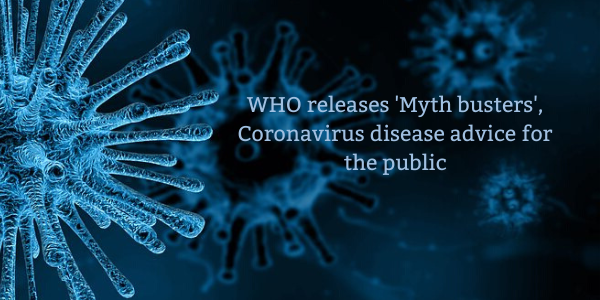
WHO releases ‘Myth busters’, Coronavirus disease advice for the public

While the corona cases continue to create havoc in the world with 83,725 confirmed cases, it also generates several misconceptions/myths among the public. In the case of coronavirus, since the facts remain unclear, the number of questions exceeds the answers. To help doctors with an answer to the public, the World Health Organisation has released an article with answers to some common man’s ‘myths’ regarding the virus.
The information given is taken from the article published by the WHO. To read the full answers, please visit the WHO website.
Are hand dryers effective in killing the new coronavirus?
No. Hand dryers are not effective in killing the 2019-nCoV.
Can an ultraviolet disinfection lamp kill the new coronavirus?
UV lamps should not be used to sterilize hands or other areas of skin as UV radiation can cause skin irritation.
How effective are thermal scanners in detecting people infected with the new coronavirus?
Thermal scanners are effective in detecting people who have developed a fever (i.e. have a higher than normal body temperature) because of infection with the new coronavirus.
Can spraying alcohol or chlorine all over your body kill the new coronavirus?
No. Spraying alcohol or chlorine all over your body will not kill viruses that have already entered your body.
Is it safe to receive a letter or a package from China?
Yes, it is safe. People receiving packages from China are not at risk of contracting the new coronavirus. From the previous analysis, we know coronaviruses do not survive long on objects, such as letters or packages.
Can pets at home spread the new coronavirus (2019-nCoV)?
At present, there is no evidence that companion animals/pets such as dogs or cats can be infected with the new coronavirus. However, it is always a good idea to wash your hands with soap and water after contact with pets.
Do vaccines against pneumonia protect you against the new coronavirus?
No. Vaccines against pneumonia, such as pneumococcal vaccine and Haemophilus influenza type B (Hib) vaccine does not protect against the new coronavirus.
Can regularly rinsing your nose with saline help prevent infection with the new coronavirus?
No. No evidence proves that regularly rinsing the nose with saline has protected people from infection with the new coronavirus.
Can eating garlic help prevent infection with the new coronavirus?
Garlic is a healthy food that may have some antimicrobial properties. However, no evidence from the current outbreak eating garlic has protected people from the new coronavirus.
Does putting on sesame oil block the new coronavirus from entering the body?
No. Sesame oil does not kill the new coronavirus.
Does the new coronavirus affect older people, or are younger people also susceptible?
People of all ages can be infected by the new coronavirus (2019-nCoV). Older people and people with pre-existing medical conditions (such as asthma, diabetes, heart disease) appear to be more vulnerable to becoming severely ill with the virus.
Are antibiotics effective in preventing and treating the new coronavirus?
No, antibiotics do not work against viruses. The new coronavirus (2019-nCoV) is a virus and, therefore, antibiotics should not be used as a means of prevention or treatment.
Are there any specific medicines to prevent or treat the new coronavirus?
To date, there is no specific medicine recommended to prevent or treat the new coronavirus (2019-nCoV).
Make sure that you follow and make others understand the WHO’s information on the coronavirus. The situation needs a panic-free, logical approach without relying on baseless myths.
Source: WHO, M3 India
https://www.who.int/emergencies/diseases/novel-coronavirus-2019/advice-for-public/myth-busters